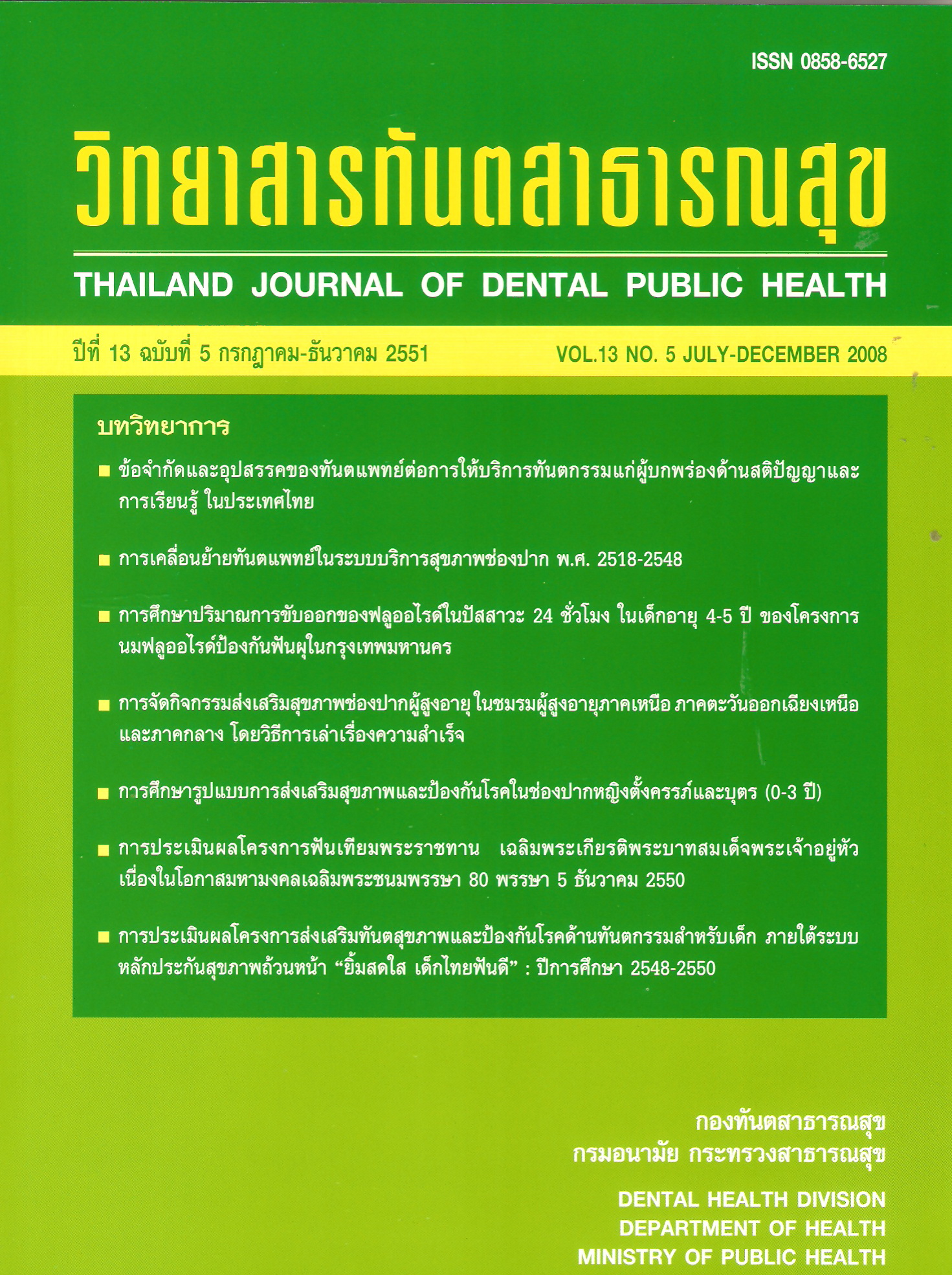Limitations and Barriers of Dentists to Dental Care for People with Intellectual Disability in Thailand
Main Article Content
Abstract
Objectives : The objective of this study was to examine limitations and barriers of dentists to provide dental services for people with intellectual disability in Thailand.
Methods: A cross-sectional survey was obtained by sending a postal questionnaire to dentists in Thai Pediatric Dental Association to assess their perception about limitations and barriers to provide dental care for people with intellectual disability and suggest how to improve accessibility. The data were analyzed using frequencies and percentages.
Results : Most respondents had experiences in dental service for the intellectual disabilities and generally agreed that they were responsible for the roles of dental care including oral health prevention and promotion, dental treatment and also role of system development. Their perception about limitations and barriers were difficulties in communication and behavioral management, lack of skill, lack of workplace facilities, lack of consulting and referral system, and also lack of policy. Recommendations to improve accessibility to dental services were promoting network and referral system, skill training for dentists and other personnel, policy and motivations for dentists to provide dental care and contracting units of dental services for the intellectual disabilities. These findings could be considered to improve accessibility to dental care of people with intellectual disability in Thailand in the future.
Downloads
Article Details
References
2. Waldeman H, Swerdloff M, Perlamn S. Children with mental retardation: stigma and stereotype images are hard to change. J Dent Child 1999: 66: 343-347.
3. Freeman R, Adams E, Gelbier S. The provision of primary dental care for patients with special needs. Prim Dent Care 1997: 1: 31-34.
4. Block M, Walken J. Effect of an extramural programme on student attitudes toward dental care for the mentally retarded. J Dent Educ 1980: 44: 158-161.
5. Shaw L, Maclaurin ET, Foster TD. Dental study of handicapped children attending special schools in Birmingham. Community Dent Oral Epidemiol 1986;14:24-7
6. Nunn JH, Murray JJ. Dental care of handicapped children by general dental practitioners. J Dent Educ 1988;52:463-5
7. Finger ST, Jedrychowski JR. Parents' perception of access to dental care for children with hand_icapping conditions. Spec Care Dentist 1989;9:195-9
8. Storhaug K, Holst D. Caries experience of dis_abled school-age children. Community Dent Oral Epidemiol 1987;15:144-9.
9. Lo GL, Soh G, Vignehsa H, Chellappah NK. Dental service utilization of disabled children. Spec Care Dentist 1991;11:194-6
10. Soble RK. Sociological and psychological considerations in special patient care: the dentist, the patient and the family. Dent Clin North Amer 1974;18:545-6
11. Smith LB. Dental care of the medically compro_mised child: a behavioural overview. J Can Dent Assoc 1981;10:667-72
12. Wetzel WE, Frierich J, Bookmeir J. Results of a questionnaire on dental care of the handicapped. Zahnarztliche Mitteilungen 1986;68:996-8
13. Bourke LF, Jago JD. Problems of persons with cerebral palsy in obtaining dental care. Aust Dent J 1983;28:221-6
14. D. M. Edwards1 and A. J. Merry2 Access to dental services for disabled people. A questionnaire survey of dental practices in Merseyside British Dental Journal 2002; 193: 253-255
15. Wilson KI. Treatment accessibility for physically and mentally handicapped people. Community Dent Health 1991; 9:187-92.


